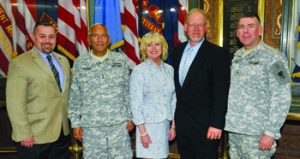
Jeff Barnes, Michigan Veterans Affairs Agency director; Major Gen. Gregory J. Vadnais, Michigan Department of Military and Veterans Affairs director and adjutant general; State Reps. Gail Haines and Greg MacMaster; and Brigadier Gen. Michael A. Stone, MDMVA assistant adjutant general, following House approval of HB 4328, the state budget measure that includes $1.5 million to implement the Heroes 2 Hired veterans employment program in Michigan.
Michigan military veterans looking for work will be able to easily find potential employers through Pure Michigan Talent Connect once the state links its jobs program to Hero 2 Hired (H2H) to help compare military and civilian employment skills.
The House approved a Military and Veterans Affairs budget that includes $1.5 million to integrate the H2H software platform with the state’s program, said state Rep. Greg MacMaster, a military veteran who serves on the House Appropriations Subcommittee on Military and Veterans Affairs, who has been researching bringing the program to Michigan for the past year. H2H translates Military Occupation Codes (MOC) to comparable skill sets in civilian jobs and has been endorsed by all military branches, as well as being the designated job-seeking tool for the Michigan National Guard.
Understanding military skills and acronyms can be confusing to employers on the civilian side of hiring, causing many veterans’ military learned skills and knowledge to go untapped. Translating the military ranks and command leadership skills qualifications into easily understood professional or management job training education or experience requirements will help increase employers’ recognition of the capabilities and employ-ability of our servicemen and women.
The effort in Michigan has already attracted recognition in Washington, D.C., as the White House is viewing the program as a pilot project for the rest of the nation. The H2H drastically improves the skill translation gap that is a barrier to employment and includes translations for MOCs from the 1970s forward. The funding is expected to operate the program for four years, including a three to four month start-up period.
The Michigan Veterans Affairs Agency, Workforce Development Agency, Michigan Economic Development Corporation, and Department of Military and Veterans Affairs support the program and estimate 14,000 soldiers and airmen will be added to the talent pool in Michigan. The departments and agencies are expected to offer more information on the program as it is developed. The military and veterans affairs budget in House Bill 4328 awaits Senate confirmation expected next week before going to the governor for consideration.
